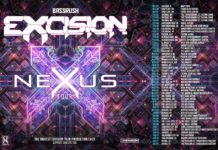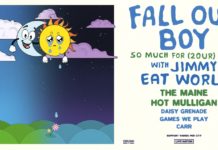The arrival of the venerable Canadian exotic rock trio’s highly anticipated new studio album, The Ocean At The End, marks the official end of the 10-year vacuum of fresh The Tea Party original material. “The Black Sea,” a stellar track from the 11-song-deep effort and the electrifying tandem of Jeff Martin (vocals, guitars, producer, songwriter); Stuart Chatwood (bass, keyboards) and Jeff Burrows (drums, percussion), completes the band’s cycle of resurrection, some of the first new music we’ve heard from them since 2004’s Seven Circles and the first project since the double-disc Live From Australia: The Reformation Tour 2012.
“The three of us probably never thought we’d be sitting here right now,” admits Martin, whose booming baritone, emotionally candid and mystical songwriting and string-bending guitar prowess has served as the creative catalyst for eight platinum and gold studio albums, one EP, one greatest hits collection, a live disc and over 2 million in global album sales.
“It’s a testament to the strength of the music that we’ve created in the past and a testament to the friendship that exists between the three of us. We had to do a lot of soul-searching, but now the bond between the three of us is stronger.”
It’s what Jeff Burrows calls, simply, “a rebirth.”
Eric: This is a band I could safely say would have never come back again. What happened?
Jeff Martin: It’s deep, it’s complicated but if you want to distill it down to a simple answer, we just missed each other too much.
Eric: I love that answer. If you still want to do it, then you should have every reason to do it.
Jeff: I can speak for myself, I kind of loss the passion for it towards the end. The Tea Party, in the best of our days, we always had this firewall. The firewall was our management Steve Hoffman. Keeping the industry and the record company away from us so we could just be who we needed to be. To make the record, once it’s done, here you go. No other cooks in the kitchen. Too many got in towards the end. Steve got sick and had to fight for his life and he couldn’t fight for us anymore. There was just too much pressure. It wasn’t the band anymore. So I had to go away, just figure myself out and find that passion for making music again. I tried many things, which I’m proud of, but as time went on one thing became clearer and clearer to me. That nothing could compare to being with my two best friends again and making that magic. So when the phone call came, back in 2010 I was game.
Eric: Who called?
Jeff: It was management that called. Our agent had been telling us we’d been getting offers every year for the band to reform.
Eric: How did that make you feel? Did you care at that point in the beginning when those calls were coming through?
Jeff: The serendipity of that phone call was I was ready to care again. Here we are. Obviously when we got back together there were some hurdles that we needed to pass. The music was always there, even the first rehearsal when we got back together. It was pure magic. The Tea Party is much more than that, it’s a trust. A friendship that goes back longer than most. So we had to get that back again, and once we did and we did it in spades. It’s stronger than ever. That’s when the new music started to come.
Eric: When you look back at when you were each doing your own projects, did you are about what the audience had to say about you doing a solo album, and not work through any problems with the band? Were there signpoints in your life that you felt you had to continue your own road?
Jeff: I’m pretty certain there would have been trepidation. How do you really – just as an individual, how do you stand up to that? The legacy of what the band is and will be. I agree with you, it’s more or less, for my personal journey anyway, it was just signposts as you said and moments – different collectives that came together, different people but it was moving me back to the band again. Moving me back to having that passion again, for the band. There’s just a lot i had to go through personally to get back there so that I could come back to Jeff and Stewart and be the captain of the ship again.
Eric: Did everyone fall easily back into their respective roles for the band?
Stuart Chapman: I think the roles evolved. We were happy – Jeff mentioned having to prove himself to us, we were happy – I don’t want to say give him another shot, but we were happy for him to regain control of the band with regard to production in the studio. It worked out great. Jeff had mentioned before, how Jeff and myself had recorded so many things in the interim that we brought a lot more to the table and took a lot of pressure off him. To produce, sing, play guitar, overdub to do all these things he was taking on, it’s a lot of pressure.
Eric: How many of the new songs were created after the band got together? Were there any you had on the solo back burner?
Jeff: Only two songs really come to mind. “Submission” and “The Water’s On Fire.” I had those as demos. I made those as demos when I knew the band was getting back together. The rest of the record was just the three of us, just like the old days in Windsor. Writing in a room, jamming being a great hard rock band. No bells, no whistles, no toys. Just plug the guitar in, let’s rock.
Eric: Sadly missed since you’ve been gone, but now you’re back. How cool is it that you get to be in a band now, again with your friends at your age?
Jeff: What do you mean, my age? [laughs]
Eric: 29. The same age as I am.
Jeff: Riiiiight.







